How to Boost Online Sales by 56% with Delivery Optimization
Want to raise sales by 56%? This guide will show you EXACTLY how to do it using delivery optimization, step-by-step. Plus what software to use to do...
Home > Blog > How to Offer Same-Day Delivery That’s Affordable?
3PLSee how to offer same day delivery that’s affordable (for your business and your customers) with best practices and a step-by-step guide.
Same-day delivery is one of the most popular delivery methods in the world. It allows customers to order a product and have it delivered to them on the same exact day. Common reasons why people choose same-day delivery is because it’s fast, convenient, and provides a seamless shopping experience.
The main reason to provide same-day delivery is to give customers EXACTLY what they want:
1. Speed
61% of consumers want you to deliver goods to them as fast as possible. (Source)
2. Convenience
77% of people say it’s more convenient for them to shop online with fast delivery. (Source)
3. Better shopping experience
68% of people will continue to place an order if they receive it on the same day. (Source)
In other words:
Faster delivery + greater convenience + higher customer satisfaction = same-day delivery.
With that said:
Same-day delivery is much more important for your business. Here’s why:
More than 90% of consumers will choose a brand based convenience. And same-day delivery is one of the best conveniences for customers.
On the other hand, if a delivery takes too long, your customers will shop elsewhere. (McKinsey)
What customers value most according to McKinsey:
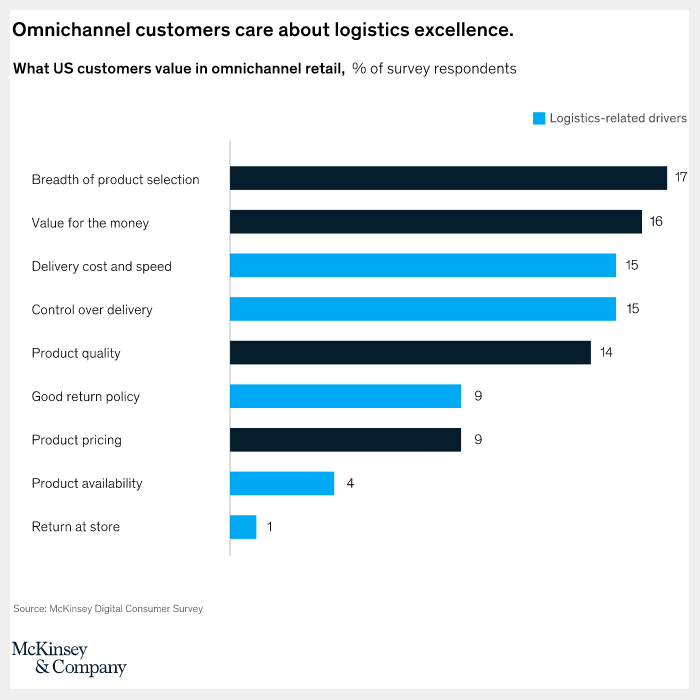
More than 25% of shoppers have abandoned their shopping carts if they saw that a brand didn’t offer same-day delivery.
In fact, more than a third of customers (36%) place an order in the first place because they see it as same-day delivery shopping.
Fast delivery raises conversion rates. In fact, Amazon Prime users convert 74% more because they qualify for speedy delivery.
While non-Prime customers convert only 13% of the time (despite qualifying for free shipping for orders over $25).
So it’s safe to say that speed is more important to customers than free delivery.
Amazon is also great at retaining its customers. In fact, 46% of Prime customers make a purchase at least once a week.
If same-day delivery raised your customer retention by just 5%, then you would, according to HubSpot, increase your revenue by 25-95%.
And it can. As this graph for interest in text ads with same-day in them clearly shows:
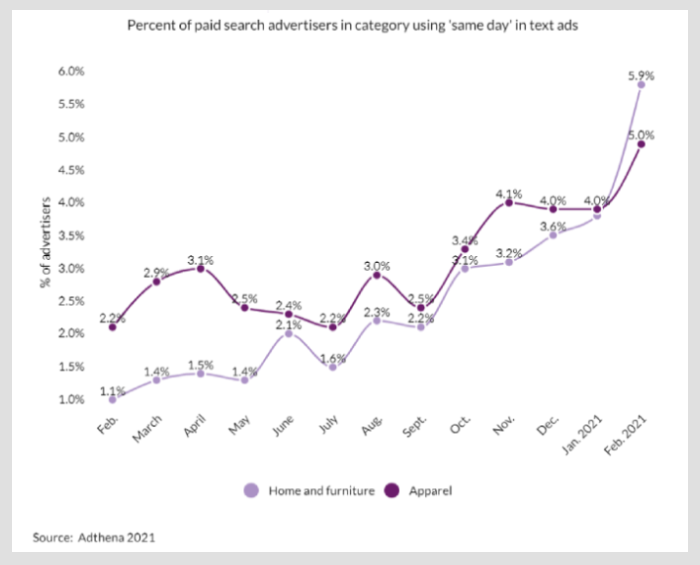
To cover costs, businesses typically transfer costs of same-day delivery onto customers. And the best part: Customers don’t mind.
In fact, according to delivery statistics, people are willing to pay a premium price if it means they’ll get same-day shipping.
A better practice is to set a minimum order price for people to qualify for same-day delivery. In doing so, you’ll raise the average order value for your company. (And as a result, your revenue.)
Now it’s time to learn how same-day delivery actually works.
When people are shopping for something and want you to deliver their purchase for them, they’ll request the service at checkout.
This is the same for shopping online or at a physical store. And it’s done before the checkout is completed:
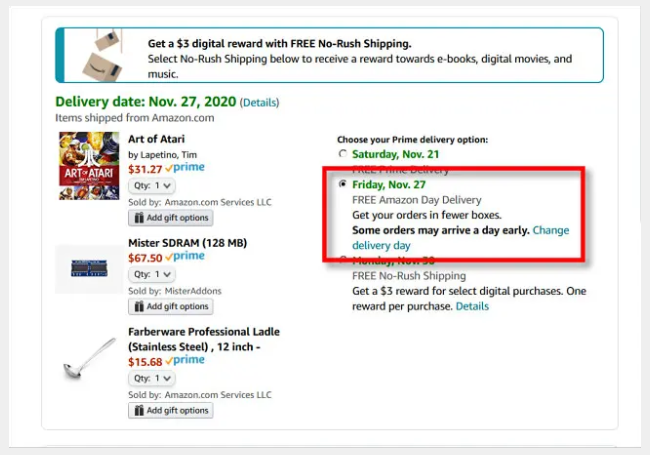
NOTE: Depending on your company policy, you don’t have to require payment. For example, customers can pay for the delivery on arrival.
After checkout, the order is registered and it has to be dispatched to a delivery driver. Typically, businesses handle same-day deliveries with one of three ways:
Regardless, you have to dispatch the driver to the pick-up location (store, depot, warehouse, or fulfillment center):
The order is picked and packed before the driver arrives.
Once the driver picks up the package, he continues to deliver it on that day.
Same-day delivery is a HUGE challenge for any organization.
Simple in theory. Quite another thing in practice, because:
You ACTUALLY have to deliver orders on the same day that they were ordered on.
And that makes same-day shipping:
And knowing this prevents you from turning same-day delivery into a bad customer experience.
Here’s what you’re up against:
Tighter delivery windows = more drop-offs. And that requires A LOT of delivery drivers.
In fact, not even Amazon is immune to this problem. That’s why the company relies heavily on self-employed drivers and independent contractors.
For your company:
Hiring a same-day courier service can be the solution to this challenge. But it is expensive.
Same-day couriers typically cost more than other delivery service providers.
Even if you’re ready to pay, that doesn’t mean you’ll find a courier that’s available.
Which brings us to the next challenge…
One day delivery isn’t cheap. Not even Amazon can compete with Amazon’s high shipping and fulfillment costs:
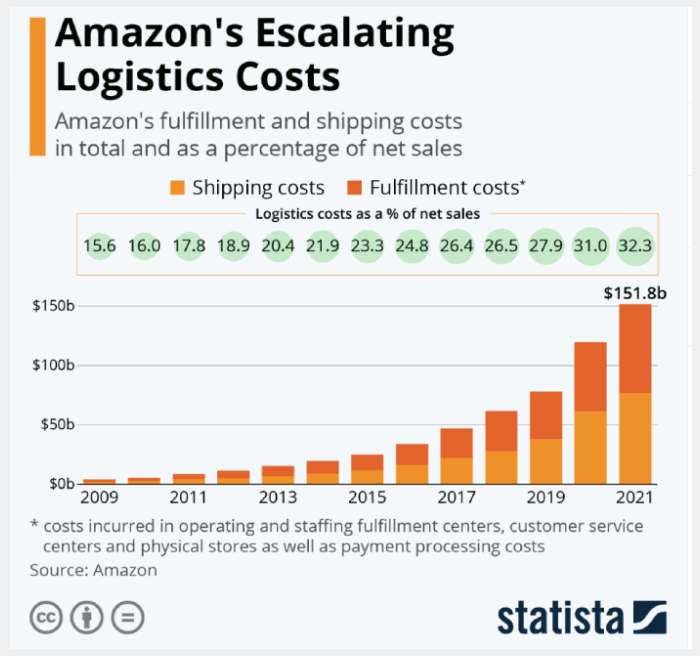
While Amazon can afford to offer same-day delivery at a loss. You CAN’T.
Luckily for you, 88% of customers are willing to pay to get their orders delivered same-day.
But same-day delivery service fees may not be enough to cover their costs.
So you’ll have to look elsewhere to drive spending down. (But more on that later.)
Businesses that deliver the same day need to be close to their customers.
It’s simple logic:
You can’t deliver a package on the same day if you need to drop it off hundreds of miles away.
In fact, a typical delivery distance is 5-10 miles. And in general, successful same-day shippers have a five mile radius for their delivery zone.
So to make your offer available to a larger audience, you need to be physically close to them.
Which means investing in real estate. To create depots and fulfillment centers near customers. (And that drives up capital expenditure.)
Good news: After years of investing in real estate in the US, Amazon has slowed down its spend. And instead, it’s focusing on optimizing its supply chain and logistics.
Want to know how your business can optimize operations to offer same-day delivery? BOOK A DEMO and learn how route optimization software can get you there.
Organizing same-day collection and delivery isn’t easy. So how do you manage same-day delivery?
First, you can do it with scheduled delivery. Whatever you might be thinking about, it is possible to schedule same-day deliveries. (Especially if you enable customers to do it for you.)
But you’ll still need to dispatch and track drivers. So…
Second, you need dispatching and tracking software.
![]()
But outdated software solutions or manual dispatching doesn’t work for same-day deliveries.
Simply put: Without good driver tracking, you can’t check fleet availability. And without knowing what drivers are available, you can’t dispatch them for on-demand orders. (Like same-day.)
When customers want something delivered today, they want it delivered today.
And when you make that promise, you better be sure to keep it.
With same-day delivery, failure isn’t an option.
That’s why on-time delivery (i.e. delivering an order on the same day) is key.
With same-day shipping, delivery speed is fast.
That makes it difficult to maintain service quality.
While customers appreciate the speed of delivery, they also want a good delivery experience.
(And that’s very difficult to do without tracking.)
With all of these challenges, you’re probably asking yourself…
Yes, absolutely!
You may think that same-day delivery is only possible if you are Amazon, Target, Walmart, or Best Buy…
But the truth is EVERY business can have same-day delivery.
It isn’t easy. It isn’t cheap. But IT IS POSSIBLE.
Now, it’s time to see the exact step-by-step process you can use to offer same-day delivery.
That’s both:
Affordable for your business…
And for your customers’ pockets.
Let’s dive right in.
Step #1: Assess Your Resources
Step #2: Create a Delivery Zone
Step #3: Set a Cut Off Time
Step #4: Set a Delivery Fee
Step #5: Add Same-Day Delivery to Your Site
Step #6: Automate Planning and Dispatch
Step #7: Evaluate Same-Day Operations
Bonus Step: Offer Free Same-Day Delivery
When it comes to same-day delivery services, assessing your resources is SUPER important.
In fact, not having a suitable fleet, workforce, tools, and cash on hand can make or break your same-day operations.
For example, not having enough delivery drivers means outsourcing to a last-mile carrier.
In case of FedEx, this starts at $61.25 per order (restricted to the US and depends on size):
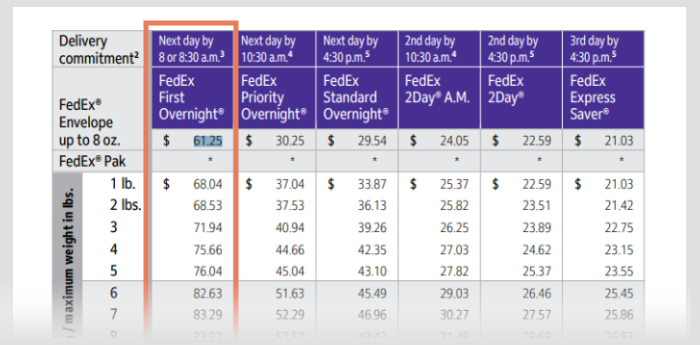
With that, here’s what you need to assess:
Your delivery fleet may be internal, external, or a mix of both.
However you delivery goods to customers you should know:
We’re not saying that you won’t be able to offer same-day delivery with your current fleet.
But, from experience, same-day fulfillment requires a lot more pick-ups and drop-offs.
So it’s worth assessing your fleet to know whether or not you can continue to provide your regular services. While adding same-day shipping to your roster of services.
Now it’s time to assess the workforce that supports your drivers.
This includes route planners, dispatchers, warehouse employees, delivery managers, and more.
Same-day delivery isn’t a job for one person.
You’ll have to have several people preparing orders for delivery…
Dispatching and tracking drivers and orders…
And making sure that all deliveries arrive on time and at the right address.
It’s impossible to manually plan and manage same-day fulfillment.
You and your staff will need software to stay on top of your operations.
For example, same-day delivery requires you to sell products rapidly.
Which means inventory changes day by day.
And unless you want to deplete it, you’ll have to carefully monitor your stock.
That’s difficult (and expensive) to do manually.
So investing in an inventory (or warehouse) management system makes sense.
Finally, you want to assess how much room in your budget you have to:
a) Start offering same-day delivery
And
b) Invest in your organization
If you don’t have enough capital, you might want to postpone buying new vehicles.
Or onboarding new staff.
And instead invest in tools that optimize delivery operations.
This can both help you to start providing a new delivery service.
And generate capital by reducing your operating costs.
The #1 goal of same-day delivery is to deliver orders on the same day they are ordered.
And it’s impossible to reach every corner of the Earth in 24 hours.
(Especially if you have one base of operation)
And that’s why you’ll have to limit the reach of your same-day delivery to a specific location. Or delivery zone.
For same-day delivery, a typical delivery zone has a radius of 5-10 miles (or 10-15 kilometers) from a pick-up location:
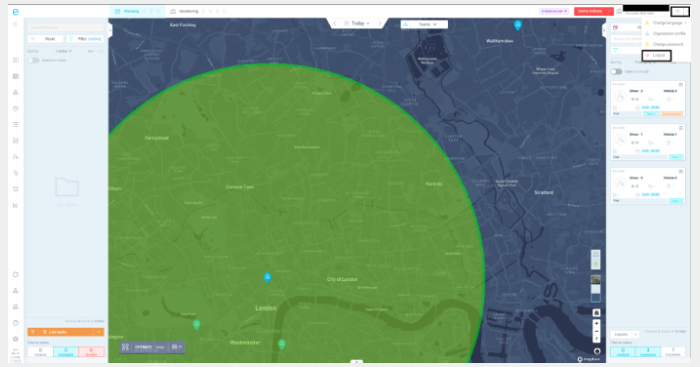
Pick-up locations are locations where you store products and prepare them for delivery.
That’s why most small to medium sized businesses associate it with local delivery.
But it doesn’t have to be so.
In fact, you can use any physical location as a fulfillment center.
This includes depots, warehouses, storage facilities, brick-and-mortar stores, and more.
Basically:
You can use any physical location that can store products and has access to the road as a fulfillment hub for same-day delivery. (With its own delivery zone around it.)
When creating delivery zones, you have to keep in mind three key things:
Only customers within your delivery zone should be able and allowed to qualify for same-day delivery.
For example, let’s say you have six depot locations around London:
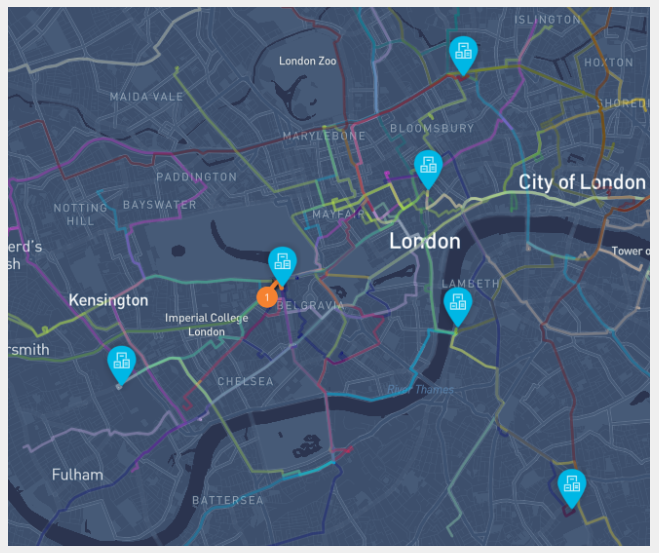
Each depot location has its own delivery zone:
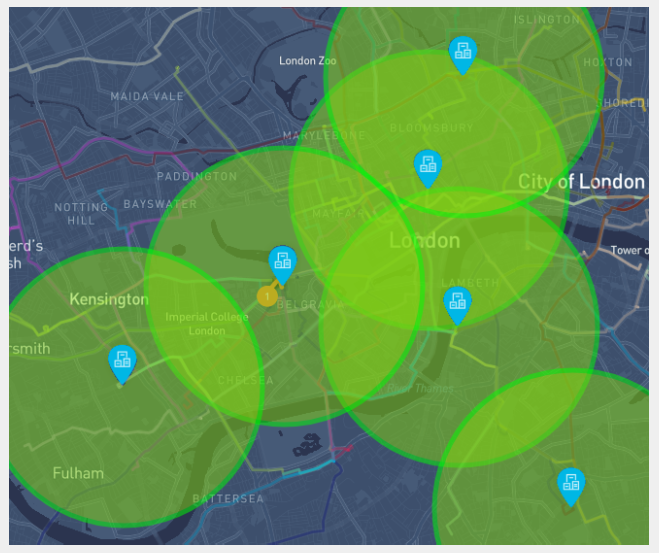
But together they form the delivery zone where you offer same-day delivery:
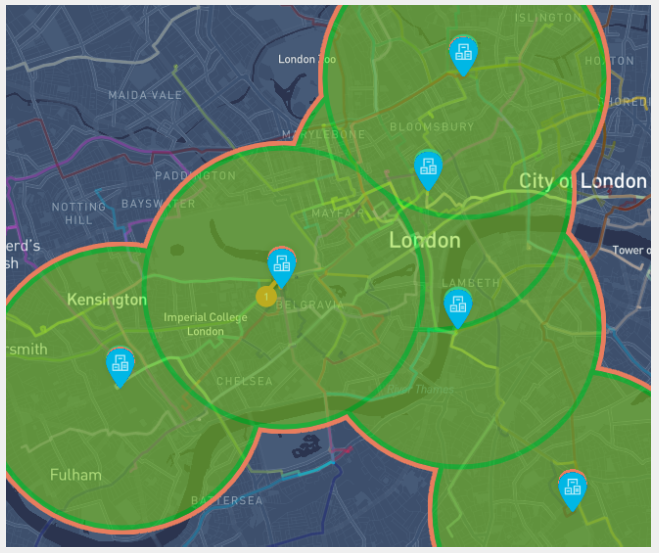
You have to make sure that you can easily get products from suppliers to keep stocks in check.
If re-supplying your depots, stores, or warehouses takes too long, customers can’t order those products. Or specific fulfillment hubs will have to stop providing same-day delivery.
Never heard of same-day delivery cut off time? Here’s a simple explanation:
Cut off time is the time before which customers can make a specific delivery request. In case of same-day delivery, it’s the time before which people can order an item, and request to have their order delivered on that same exact day.
Simply put:
It’s the time when a specific delivery service is available.
For example, a typical cut off time for same-day delivery is between 16:00 and 17:00.

After that, the same-day delivery service is no longer available. And customers will have to choose a different delivery option at checkout.
NOTE: You should also set a start time for same-day delivery to let customers know when they can qualify for the service.
To set a cut off time for your same-day delivery, you have to keep in mind two things:
Specifically, your delivery drivers’ work hours. The drivers should have enough time to deliver all orders without working overtime. (But the same goes for other supporting staff.) You don’t want to pay for overtime and drive up costs, if you don’t have to.
Determine how many same-day orders your drivers can fulfill. And then estimate how much time they’ll need to complete each delivery.
This will let you know whether the cut off time has to be earlier than you’ve planned. And help you set the best cut off time for your drivers and customers.
How much you’ll charge for same-day delivery is completely up to you.
How much that will actually be will depend on how much you want to cover costs.
And strike a balance between customer satisfaction and operational expenditure.
But as with any other delivery service, you can choose one of two paths:
For now, let’s only look at your first option (the standard same-day delivery).
If you want to know how much same-day delivery costs, you need to look at the expenses associated with it. This includes:
Adding all of your operating expenses and dividing it with the no. of orders fulfilled via same-day services will give you a good idea of your cost per order:
You can always calculate your cost per mile to know how much you spend based on distance.
Once you know how much you spend on same-day delivery, you’ll want to incorporate that cost somehow into your pricing. And you have five different options:
A flat fee means customers will pay a fixed price to get orders delivered same-day.
Businesses that use this option typically charge the cost of delivering items on the same day they were ordered.
So, for example, if it costs you on average $15, you’ll charge same day parcel delivery 15$.
Simple enough… And as we’ve mentioned, customers don’t mind spending money if it means they’ll receive their order quickly.
But you can and should try to provide more value.
This means customers will have to spend a certain amount of money on your products to qualify for same-day delivery.
The cost is transferred to them because they’ll buy more items, while you’ll have to complete one delivery to fulfill the order.
By raising your order value, you’ll have higher margins, and generate more profit. Which will cover the cost of same-day services.
The same is true for luxury products.
If you offer same-day delivery on luxury goods, you’ll cover delivery costs since those goods have higher margins. While add-ons like same-day delivery can get people buying expensive products.
We generally don’t recommend that you do this. (But it is an option.)
If customers notice you’re trying to cover costs by raising prices, they’ll go elsewhere.
And that can have a seriously negative impact on your reputation.
Which can do more damage than covering the cost of delivery in the first place.
This is similar to what Amazon is doing with its’ Prime Membership:
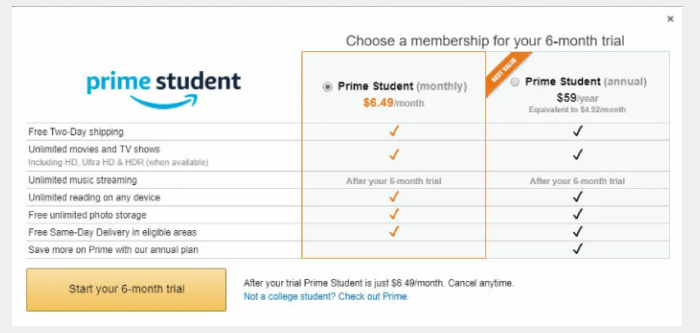
Customers pay a certain monthly or annual subscription to qualify for specific benefits.
And in the case of same-day delivery this should cover the costs of operations.
This can extend to returning customers who can qualify for fast fulfillment if they spend a certain amount on a regular basis.
Or as a gift to stimulate additional purchases.
Now that you know that your operations can handle it, which customers can qualify, when is the cut off time, and how much it will cost, it’s time to add same-day delivery to your website.
There’s just one problem:
We can’t help you here.
Adding same-day delivery to your website depends on, well, your site. Specifically, the engine, code, and content management system (CMS) on which it runs on.
Your best option is to contact your developer, and let them know what you want to do. So the developer knows how to do it.
That said, we can provide you with a few best practices.
Customers should be able to choose how they want you to deliver their purchases at checkout. This includes same-day delivery.
If you’ve never had delivery options on your website, you’ll create it from scratch. And if you already offer some kind of delivery service, all you need to do is to add same-day shipping to the selection.
Make sure to add your delivery options before the payment information. So customers know what the final pricing will be. (Especially if you plan on adding a shipping fee.)
Here’s how this looks on Amazon:
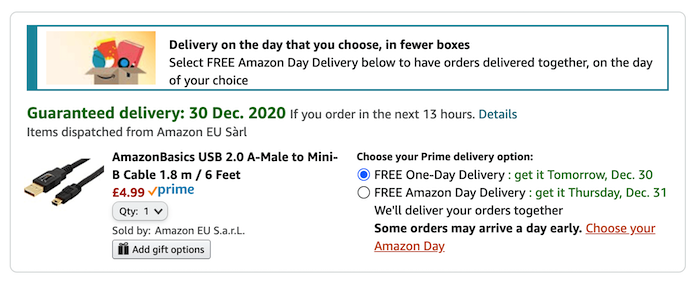
And here’s another example on Target:
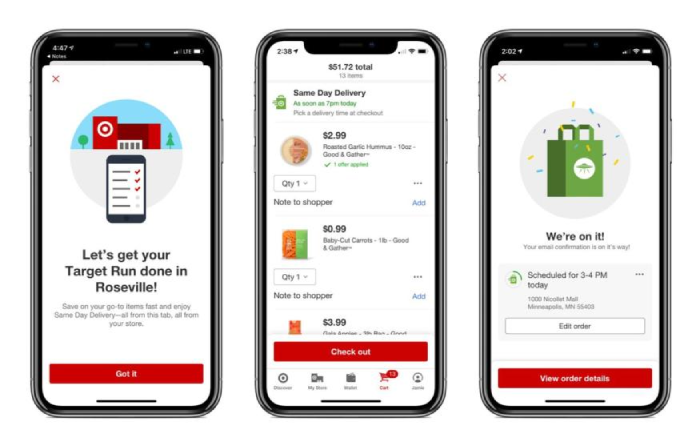
Not all delivery options should be visible to each person that lands at checkout.
Instead you should request the customer’s address first.
Once the person inputs the address, the site can compare it against your delivery zone.
If the address is inside the delivery zone, the person will see same-day delivery as an option at checkout. If not, the person will only see delivery options available for their location.
That way the customer’s experience remains intact. And no one will wonder why they can’t use your service.
This seems obvious enough. But you should display the cut off time either as a static notice or as a pop-up notification once someone selects same-day delivery.
Using delivery slots is a solid way to limit how many same-day deliveries you handle. (Especially if you have limited resources.)
A delivery slot is a specific time window that’s allocated for a single delivery, which customers choose to book a delivery.
Let’s say you plan to offer same-day delivery until the cut-off time at 4 PM.
That means your drivers have from 4 PM to 8 PM to deliver those orders.
When a customer lands at checkout, they’ll view available delivery slots.
For example, there will be 4 slots per hour: 4:00, 4:15, 4:30, 4:45; then 5:00, 5:15… and so on.
Here’s an example:
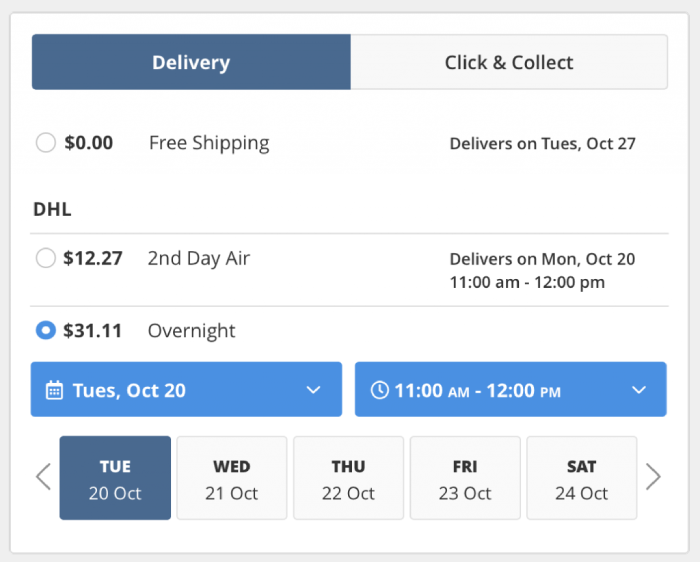
(Source)
If you have multiple drivers, then you can have multiple slots open for the same time window.
And if there are no slots available for that day, the customer will see that and choose a different delivery option, such as overnight shipping.
There are three tools that most of our users choose to manage their deliveries:
OMS like WooCommerce or Shopify serve as an order management platform.
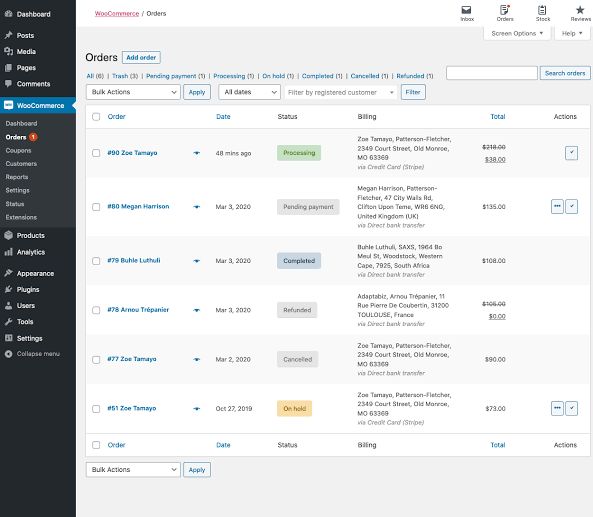
Connecting it to your website will allow you to use the site as an ecommerce platform. But it will also enable you to easily manage orders and delivery requests.
An inventory management system helps you to track and manage the volume of goods you have in stock. Connecting it to your website enables you to automatically manage inventory volumes. This helps you to know:
1. How much specific products you have on offer
2. What products and how much of them have sold
3. When do you need to re-supply a certain product
Connecting route optimization software (also known as delivery management software) helps you to automatically add orders to your delivery schedule. When a customer completes a delivery request, the task data is transferred to the order list on the dashboard, where you can assign it to a driver or route for delivery.
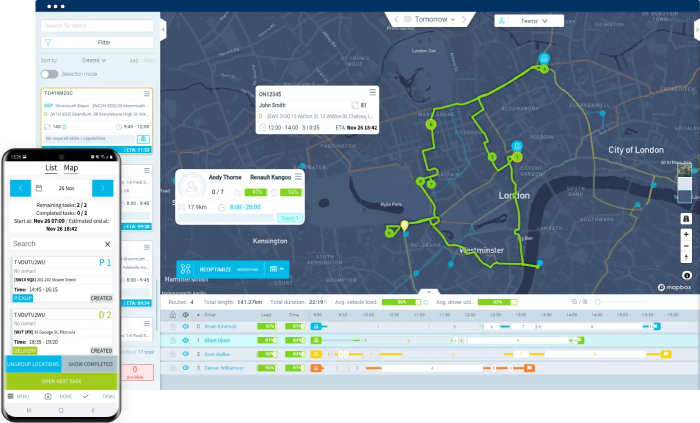
All three tools plug into websites differently. But in most cases, you’ll rely on API Integration to connect the site with the app.
6. Test your website before launch.
Finally, you should test the new same-day delivery option before launching it.
Make sure that everything runs smoothly from the customer perspective:
If the customer can select the delivery option…
If the site recognizes the delivery area…
If you can select delivery slots.
And make sure that the website works with other software solutions:
If order data is stored correctly…
If products are removed from inventory following a purchase…
If order data is transferred to the route optimization software.
In case everything works fine, there’s nothing else left to start fulfilling same-day orders.
Now that everything is set up on your website, same-day delivery requests should start arriving.
So it’s time to handle them.
To do this, you’ll have to rely on software.
Specifically, route optimization software.
(We’ve mentioned this tool a little while ago.)
Route optimization software like eLogii will automate the way you plan, manage and optimize same-day shipping.
Here’s how:
After a customer completes a purchase, the order information is sent to the routing software, where it’s added to the task list.
With eLogii this is done automatically via the routing API:
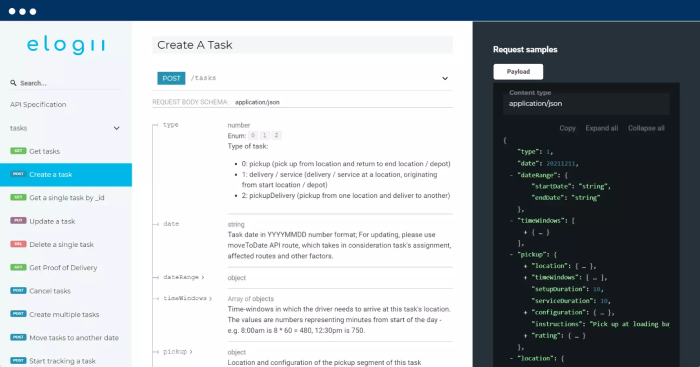
But you can also upload .CSV files from your OMS:
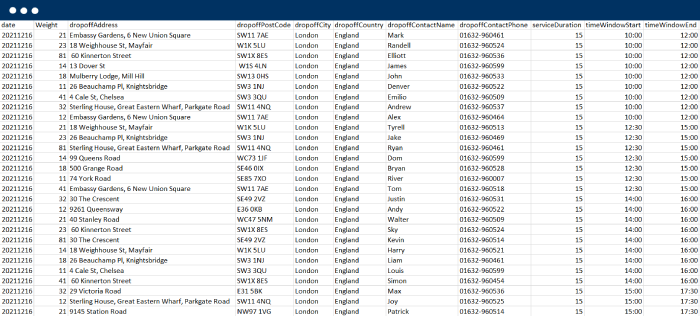
Or manually add tasks to the software:
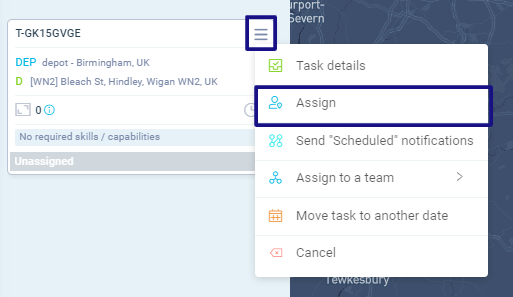
Once you’ve selected the date and tasks, all you have to do is click the Optimize button. And the software will automatically generate the routes for all available drivers:
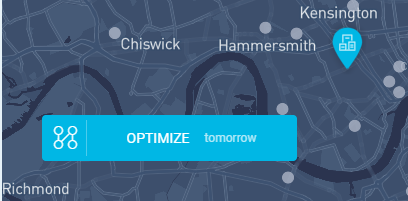
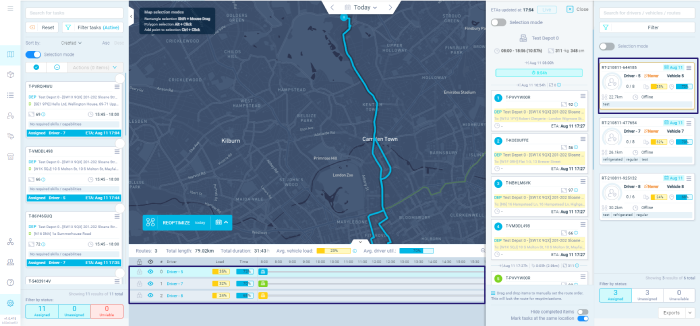
Unlike simple route planners like Google Maps, you can plan routes and schedules for your entire fleet at once.
Each route that’s generated is also optimized for maximum efficiency. And you can do this based on multiple parameters.

For example, when it comes to same-day delivery, our users choose to plan around traffic, distance, and route density for maximum delivery speed and efficiency.
Watch out how you balance orders among your drivers.
That’s because you may get 50+ same-day requests per day even with delivery slots in place.
And that’s more than any one driver can handle.
So you’ll have to divide orders among several drivers to handle all of them.
eLogii, for example, has rolled out a few new features that allow you to balance tasks among selected drivers:
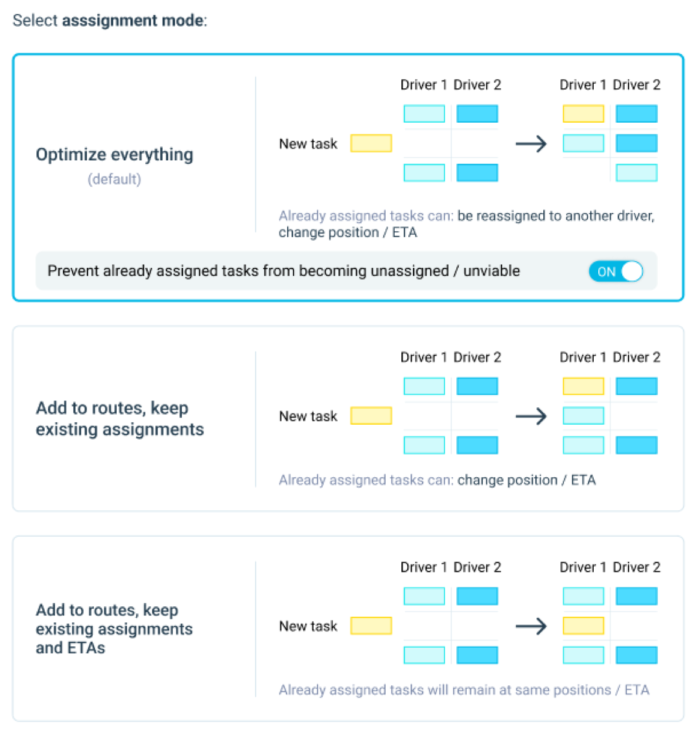
And balance loads based on route efficiency, load capacity, distance, no. of jobs, and most importantly, time:
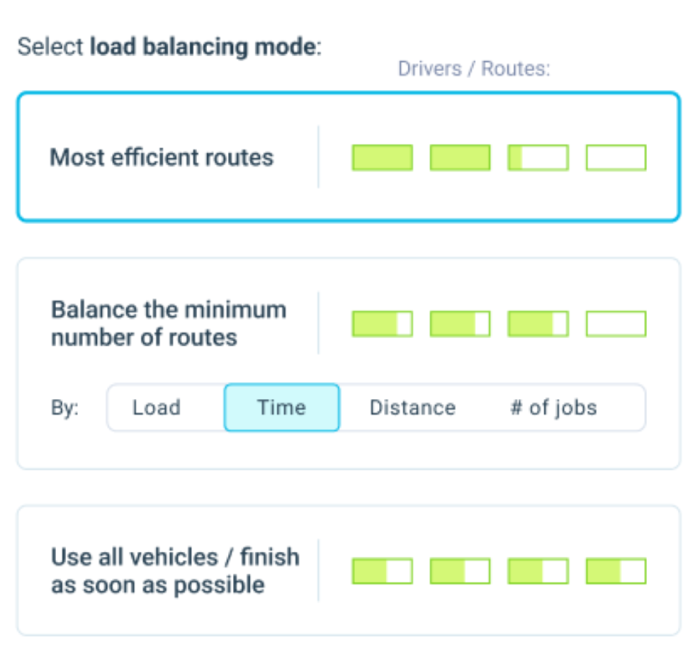
This can help you not only handle same-day deliveries more efficiently, but also more quickly.
There is no manual dispatching with routing software. Instead, the software dispatches drivers automatically.
Once you plan all the routes and schedules, you lock the information.
And software shares that data with your drivers via the Driver App on their phones:
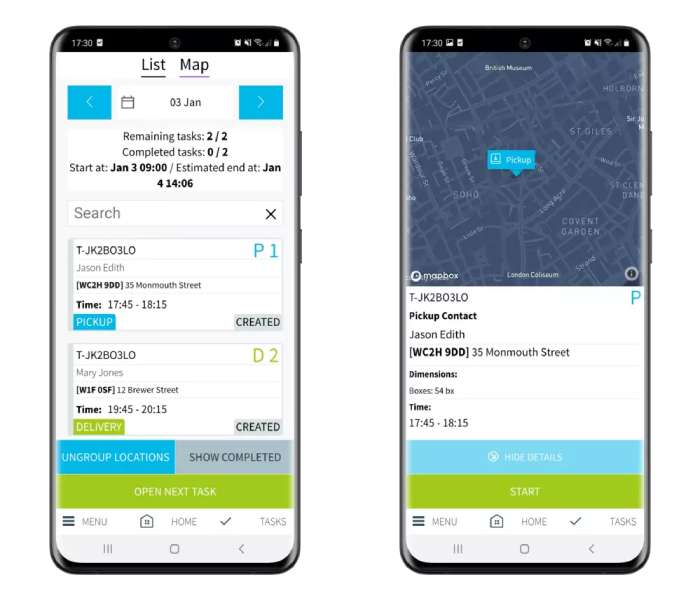
The driver can then access the information and use it to know where to go and what to do.
But also perform other actions like collect proof of delivery:
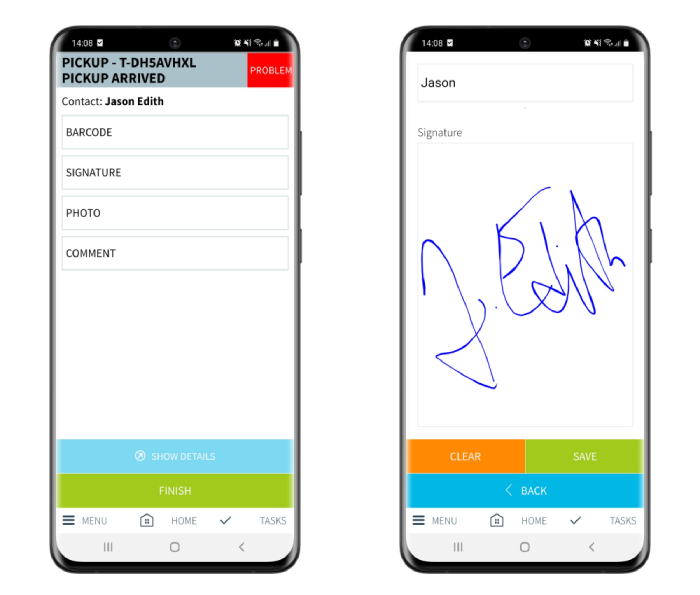
While all the data from their phone is available on the dashboard for dispatchers to review.
Which has two other benefits…
With solutions like eLogii, you can track drivers progress along their routes in real-time via the Monitoring Screen:
![]()
This allows you to see the driver’s location:
![]()
Estimated times of arrival (ETAs):
![]()
And what tasks drivers have completed and how many are remaining:

So you can stay on top of driver’s activities, to know if drivers are handling same-day deliveries.
This also enables you to send tracking links to customers:
![]()
With a tracking link, customers can see the status of their delivery and its location:
![]()
These links help to improve the delivery experience.
But also speed up drop-offs. Since customers can anticipate when exactly their package will arrive.
Now that your new delivery option is up and running, it’s time for the last step: evaluating same-day delivery operations to check for quality, cost, and customer satisfaction.
This step is key.
Why? There are LOTS of key metrics in delivery logistics that define the performance of your operations. And tell you whether you’re doing a good job or not.
That said, you’ll see this step best from examples. So we’re going to help you choose the best KPIs from a list by walking you through a quick example on how to actually measure same-day delivery.
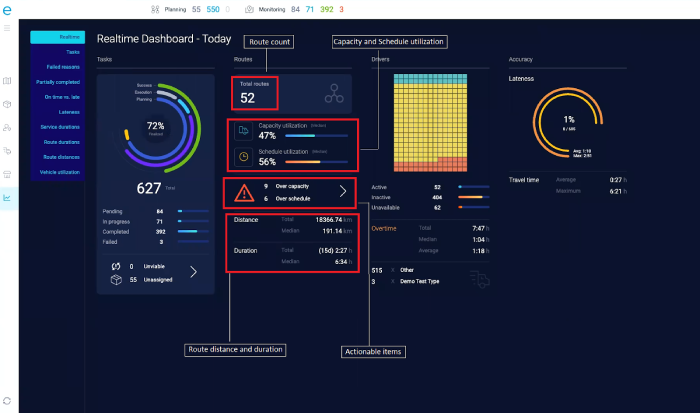
(For this example we’re going to be using eLogii’s Real-Time and Historical Data Analytics feature because this is the best way to evaluate delivery performance with route optimization software.)
Here’s what you should observe:
This shows you how many same-day deliveries have been completed over a certain period of time. That helps you to understand how successful your new service is: whether customers are using it, and if the number is increasing over time.
In eLogii, you can use delivery analytics to see all tasks completed by your delivery team. Here’s what that looks like:
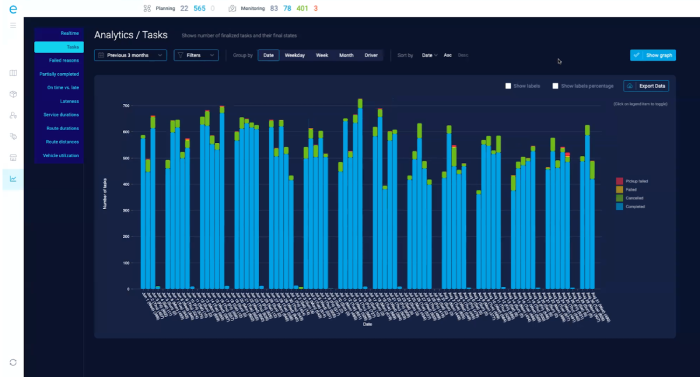
You can then create a filter for same-day delivery. And review how many have been completed per week, month, year, or by driver.
This shows you how many same-day deliveries have been delivered on time for a specific period. That helps you to control the quality of the service. And ensure all same-day shipping arrives on the same day.
With eLogii, you can compare on-time delivery with late deliveries:
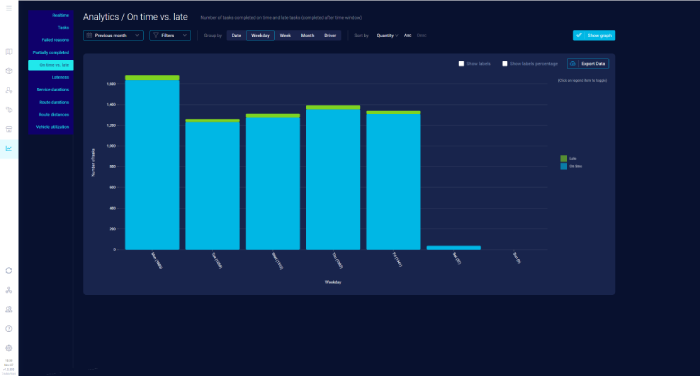
And observe lateness to see how late your drivers exactly are:
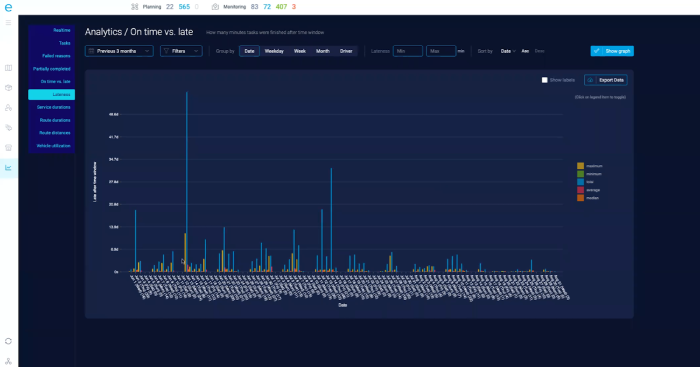
Pro Tip: You can also use eLogii to review failed delivery attempts. And see why your drivers failed to deliver orders:
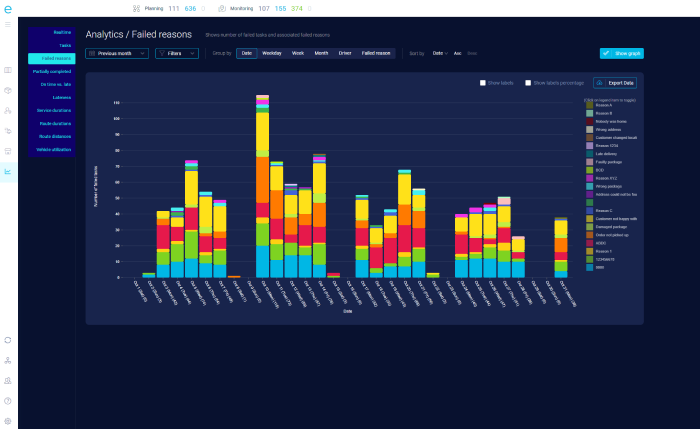
This shows you how much money you’re spending on same-day delivery operations. So you know whether same-day delivery is actually affordable or not.
The cost of your delivery depends on how much money your operational expenditure. For this, you’ll have to take into account employee wages, fuel, overhead, and more.
You can use eLogii to get a more accurate breakdown of transportation costs.
For example, you can review vehicle utilization:
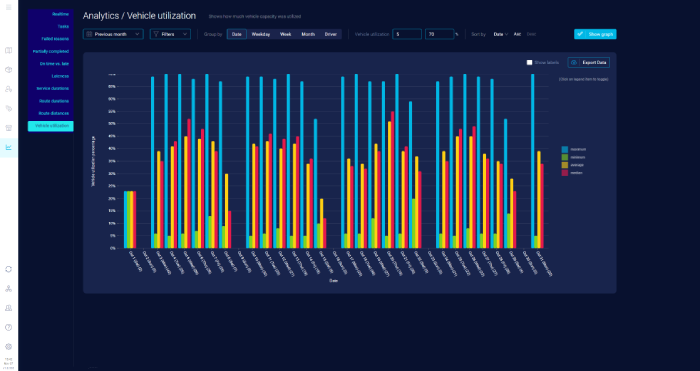
Or route distance (which can help you to calculate your cost per mile):
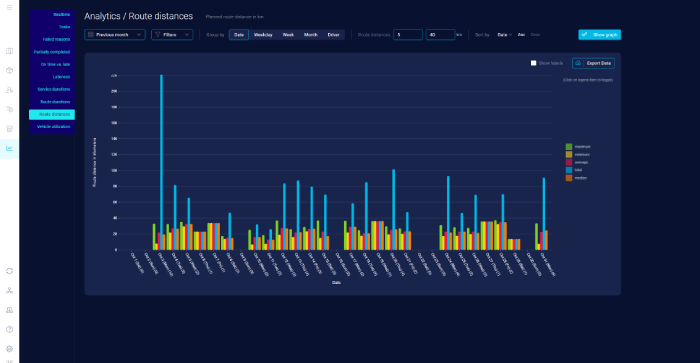
We also have a free feature on our website which you can use to calculate ROI with eLogii:
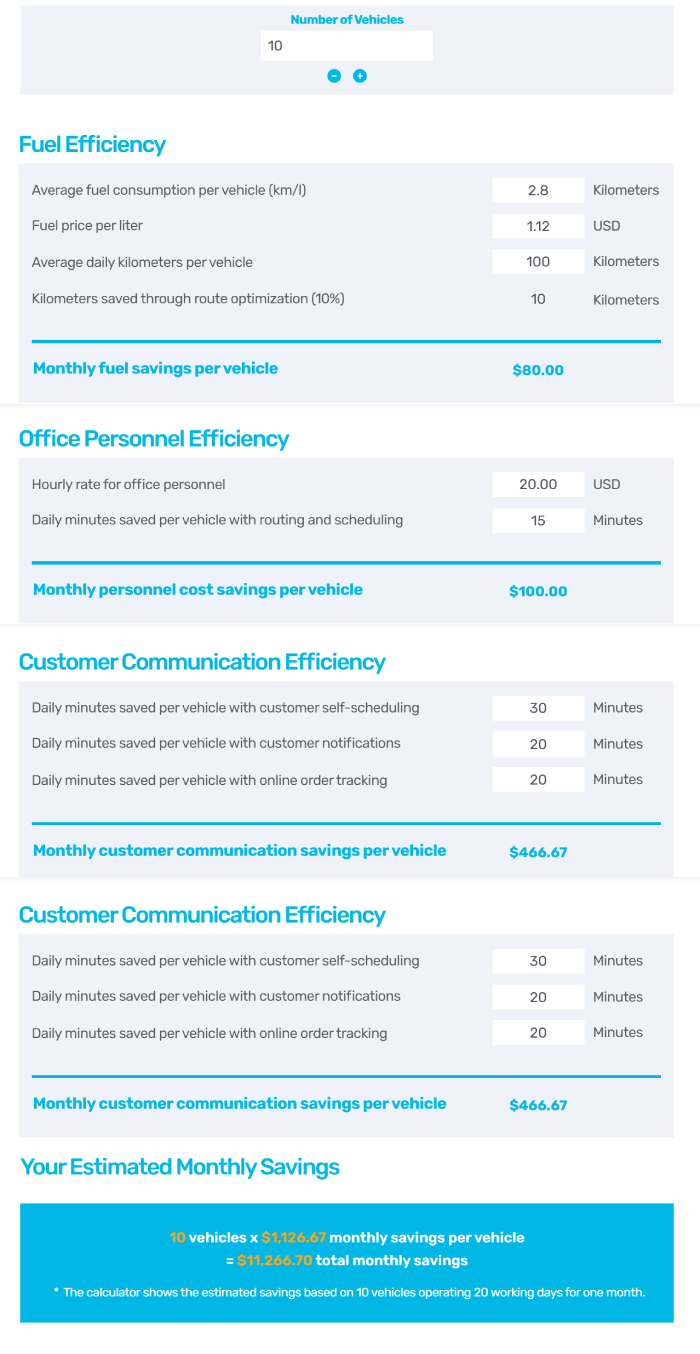
This shows you how much money same-day delivery orders bring you. That can help you to see how profitable your new service is: especially if you have minimum order value, service fee, or special offer on luxury goods in place.
With eLogii, you can export tasks at a click of a button and use advanced filtering options to see value per order, the total order value, or the average order value for each same-day delivery:
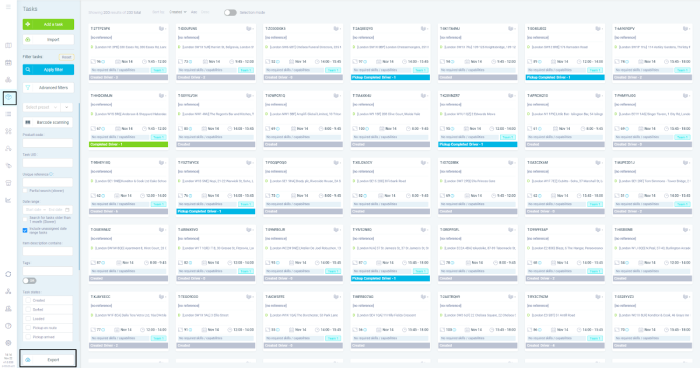
This shows you what customers rate their same-day shipping experience. That ensures you maintain the quality of delivery even with fast fulfillment.
With eLogii, customers can rate drivers and leave feedback on the tracking link that they receive:
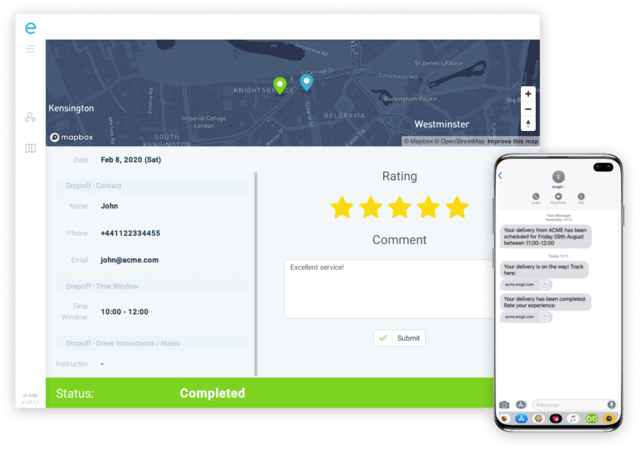
And you can review each driver’s ratings on their profile in the dashboard:
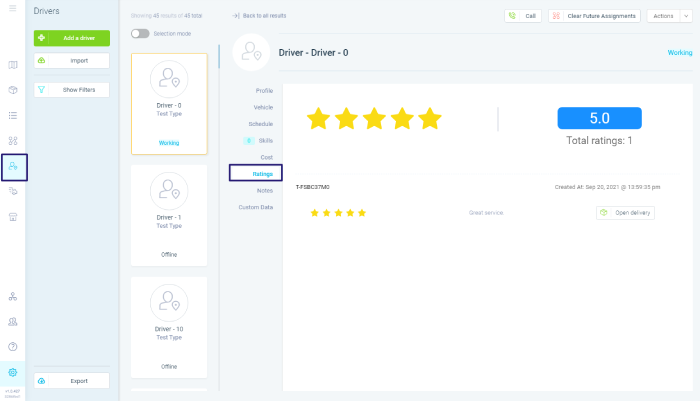
We’ve already shown you how you can offer same-day services when you transfer those costs onto your customers.
Now it’s time to see if you can offer same-day delivery for free.
Keep in mind:
Same-day delivery is NEVER free.
But you can choose to absorb the cost of delivery and make it seem like it’s free.
(At least to your customers.)
You’ll still use the same-day pricing strategies that we’ve discussed:
In doing so, you’ll generate higher returns through better margins or higher order values.
In other words:
You’ll increase profit from sales and use the extra profit to cover the cost of delivery.
That should motivate more people to use your service. And choose you over your competitors.
And as you saw, route optimization software can help you generate solid returns and savings on monthly operating expenses:
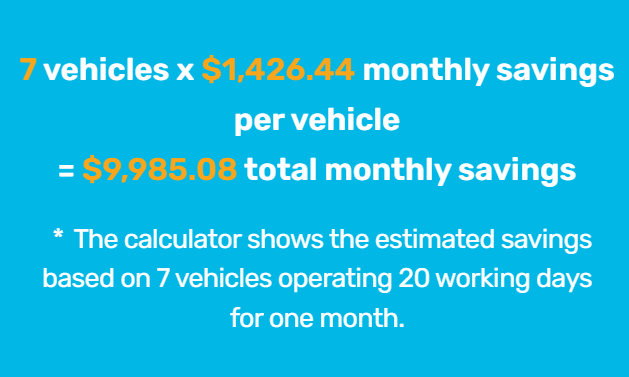
Which means you can lower delivery cost to a minimum through optimization. So that it doesn’t become too much of a burden to offer a free delivery service.
We hope you enjoyed our guide on same-day delivery.
Now we’d like to hear from you:
Do you think it’s possible for your business to start offering same-day delivery services?
Do you think your customers would appreciate it?
Let us know.
And if you’d like to see how our route optimization software can help you get started, then…

Want to raise sales by 56%? This guide will show you EXACTLY how to do it using delivery optimization, step-by-step. Plus what software to use to do...
In this article, we reveal how delivery management software can help you to win more customers, handle more orders, and make more money.
Check out this post if you want to learn advanced strategies, tips, and tactics you can use with route planning software to improve delivery...
Be the first to know when new articles are released. eLogii has a market-leading blog and resources centre designed specifically to help business across countless distribution and field-services sub sectors worldwide to succeed with actionable content and tips.
